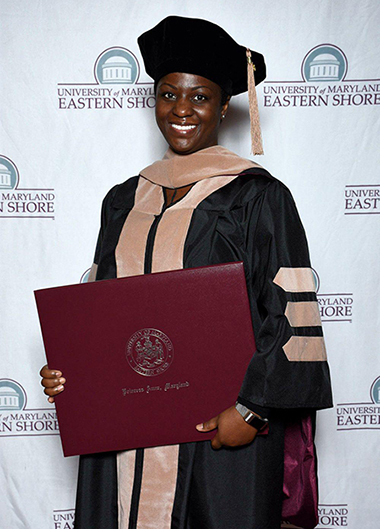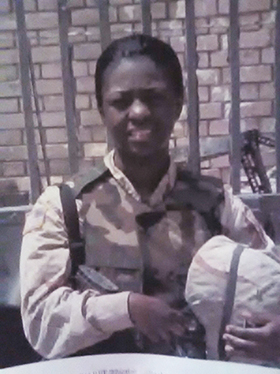Woman Warrior Navigates New Path with Help from Veteran Peer Support

Veteran Rochelle Cooper had her life planned when she was in high school. After graduation, she would attend college to focus on furthering her education. She would also join the Army Reserves, spending one weekend a month and two weeks a year serving the country and developing special skillsets in the process. Rochelle had it all figured out.
As is often the case, especially in the military, life had other plans.
While in her junior year of college, and shortly before Christmas, Rochelle received a 10-day notice that she was going to be activated and deployed to the Middle East. She notified her professors and took her exams early before embarking on what would become a life-altering mission.
Going to War
Rochelle was just 21 years old when she arrived in Kuwait in December 2002. She was part of an advance group of around 20 soldiers that didn’t include other members of her regular Reserves unit.
“It was kind of isolating the first few months because I didn't really know anyone. I didn't work with them on a regular basis and I didn't have close relationships,” Rochelle said.
Rochelle served as a Civil Affairs specialist (38A) and spent her early time in Kuwait working with civilians to provide assistance and facilitate aid from other organizations. She was sent to Iraq in March 2003, and was assigned to a public health team, where she was the only enlisted member. Eventually, the rest of her Reserves brigade joined her in Baghdad and treated the young soldier with a special reverence because she had been there the longest.

The public health team Rochelle was assigned to would visit public hospitals around the region to determine the equipment, care, and medical resources needed for individuals. As the lowest-ranking member of the team, Rochelle would often be tasked with guarding the Humvee during hospital visits.
“You're just really on high alert, and having to be that close to the firefight, my anxiety was through the roof,” Rochelle said.
During one trip to a hospital – on Rochelle’s 22nd birthday – the team was ambushed, and a firefight broke out. Rochelle wasn’t physically injured in the attack, but she did have to return fire. It’s almost impossible to think the constant need to be on alert and deal with life-and-death situations on a regular basis wouldn’t take a toll on a person, especially someone so young. According to WWP’s most recent Annual Warrior Survey, 76% of warriors reported having post-traumatic stress disorder (PTSD).
While Rochelle was in the midst of it, she could focus on the task at hand, but coming home presented its own challenges.
The Battle Back Home
Rochelle had served her country honorably, during war, and even earned a Bronze Star, but when she returned home, she tried to separate herself from her military experience. She just wanted to forget.
When I got out of the military, I didn't want to be affiliated with the military because of the trauma … at the time, I did not know that I was suffering, or that the way I was acting was a result of trauma.
“I have a different story, I guess. It’s of denial and aversion,” Rochelle said. “When I got out of the military, I didn't want to be affiliated with the military because of the trauma. I tried to come home and be as normal as possible. I finished school, got married, started a family, and went to grad school. I was just keeping myself busy. But at the time, I did not know that I was suffering, or that the way I was acting was a result of trauma.”
Keeping her experiences and emotions buried was her coping mechanism, but it was taking a toll on her mental health.
“I knew I had problems sleeping when I came back. So, I was just used to not sleeping. But I kept going,” Rochelle said. “I was in school constantly; I had a new baby. It wasn't until 2009 when my world shifted because I finally finished school. And then it was like I had too much time on my hands. I was always used to being over-extended. I think I had a nervous breakdown because I just didn't know what to do. I didn't feel purposeful.”
Around the same time, Rochelle found out she was pregnant with her second child. She was also still feeling lost without the constant distraction of a school courseload and decided to seek treatment for depression. She was put on medication to help alleviate some of her symptoms, but after giving birth, her gynecologist suggested seeking medical care through the Department of Veterans Affairs (VA) to address some underlying issues related to her depression. The thought of going down that path terrified Rochelle.
“I was afraid to deal with the military; I was afraid of getting called back up,” Rochelle said. “I was a different person. I was a mother versus being a kid in college.”
Anxious, but eager to get better, Rochelle reached out to VA in search of mental health services that could help improve her mental well-being. She got connected to mental health counselors. She was evaluated by VA doctors, who requested witness statements from her family and friends about her depression. She was surprised by what she read. Her friends and family knew she was dealing with depression, but she didn’t realize how long they’d noticed something was wrong – even when she hadn’t.
“I didn't know that they saw that I was hurting all along,” Rochelle said. “I thought I was masking it because I was so busy. I always worked, always went to school. I still showed up for family events. I did things, but I guess I had an edge, and no one ever approached me about it, because they knew or assumed that talking about military stuff would evoke some type of trauma reaction.”
Healing the Hurt
Taking the chance to reopen her military affiliation turned out to be the right decision. She began dealing with her trauma instead of hiding from it.
In 2012, Rochelle found Wounded Warrior Project® (WWP), and began attending connection events. Through WWP, she was able to reconnect to her military background in a positive way, building connections with other veterans who understood what she had gone through and was going through. In 2014, she moved to Waldorf, Maryland, and began looking for resources in the area. That’s when she discovered a WWP Peer Support Group based in the area.
“That has been life-changing,” Rochelle said. “At that point of my recovery, I wasn't seeing a counselor regularly. So going to the peer support meetings was beneficial because you get to go there, and just release whatever is troubling you. And it's a safe space. Even times when I did not feel like sharing, it was helpful to be there, and know that you weren't the only one going through things. People are at different stages of their recovery, but you still knew that you weren't alone.”
Find out more about women warriors and what WWP is doing to serve them
With the support of fellow veterans and the healing she had started, Rochelle went on to get her doctorate of philosophy. Members of her WWP Peer Support group traveled several hours to see her graduate. The closeness she feels to the peer support group members is more like family than friends.
“To meet up with like-minded people; to have someone that you can confide in if you don't want to talk to a professional, just for familiarity’s sake, who know what you're going through, has been very beneficial in my recovery,” Rochelle said. “I wouldn't change it for the world. And Wounded Warrior Project has made that possible. We look forward to seeing each other every month. It's become a real family environment.”
Finding Herself and Living Her Purpose
Although Rochelle’s life didn’t follow the path she planned in high school, she has learned to embrace the woman she has become and is in a much better place than she could have imagined when she returned from Iraq. She encourages other veterans not to mask or avoid their feelings, but to find people and resources to help deal with those emotions.
“Definitely reach out for help,” Rochelle said. “I didn't know that there are people out there going through similar things. I didn't know there were agencies out there trying to help individuals like myself. But once I found out, I totally embraced it.”
Rochelle also encourages veterans, especially women warriors, to realize that it’s all right to put yourself first sometimes.
“Through Wounded Warrior Project, I’ve been able to attend events that I can take my children to or women-only events,” she said. “You have to give yourself the grace to say it’s OK for me to go off and take care of myself sometimes. For years, a part of me felt a little guilty about leaving my regular world to be around military people again, but it's become a lifestyle now.”
Rochelle still has times when she has to remind herself to slow down and enjoy the small things. In life, there are always ups and downs, but Rochelle’s dedication to getting help and connecting to other veterans have helped make the road to recovery a lot less bumpy. It wasn’t an easy process, but Rochelle feels like she’s a success story.
“I'm in a really good space, because I'm finally calm, and I feel like I’m living my purpose.”
To learn more about veteran peer support in your area, register with WWP to receive notifications or reach out to WWP’s resource center for additional assistance.
Contact: — Paris Moulden, Public Relations, pmoulden@woundedwarriorproject.org, 904.570.7910
About Wounded Warrior Project
Since 2003, Wounded Warrior Project® (WWP) has been meeting the growing needs of warriors, their families, and caregivers — helping them achieve their highest ambition. Learn more.